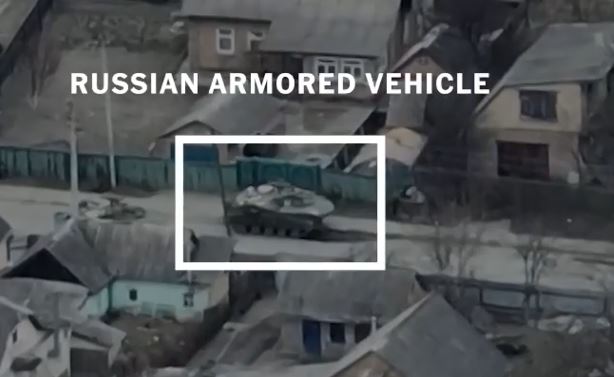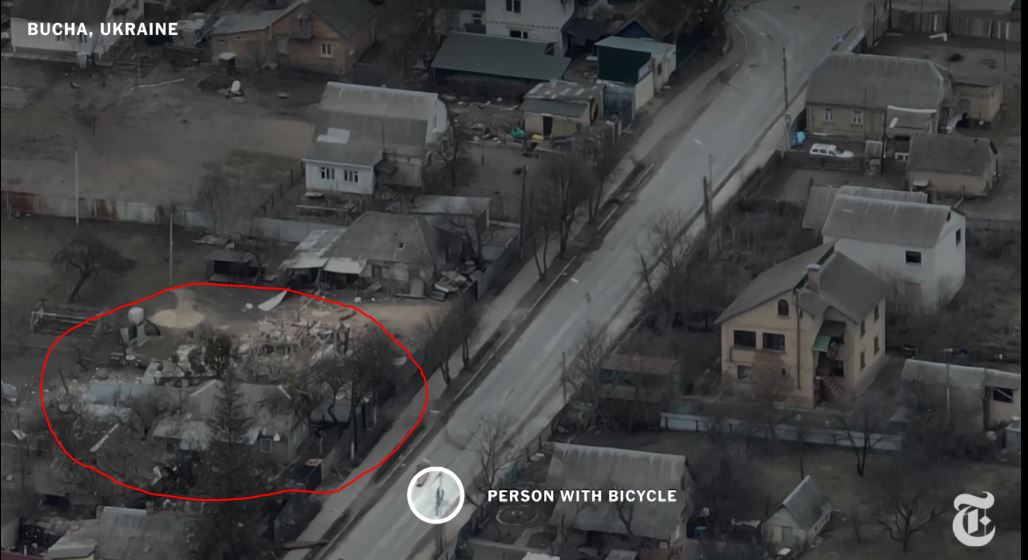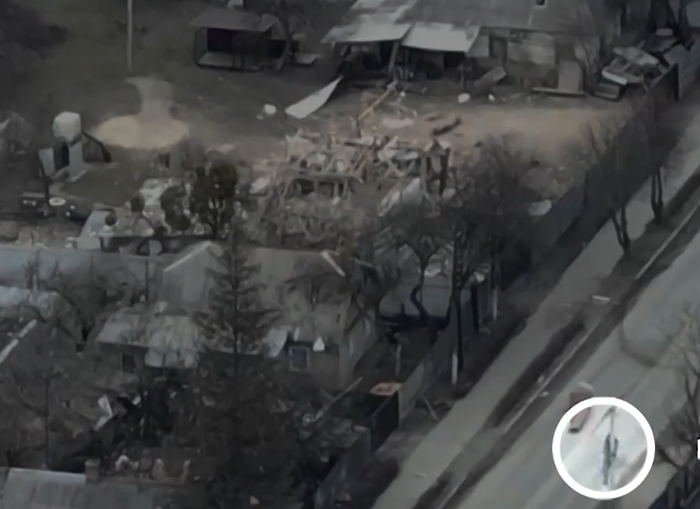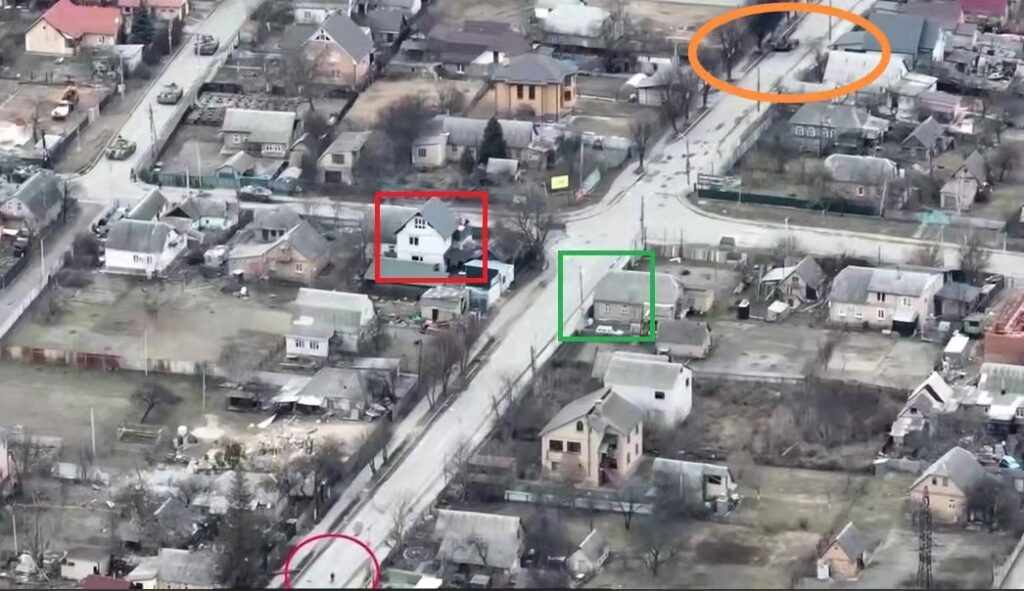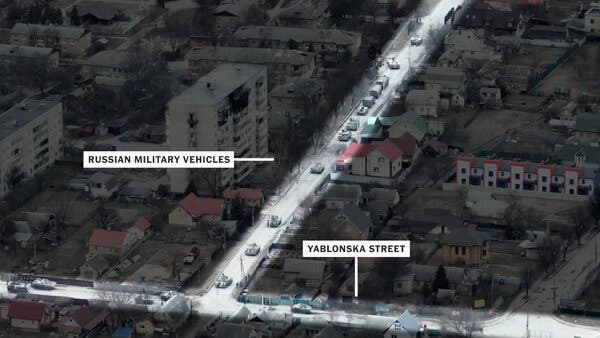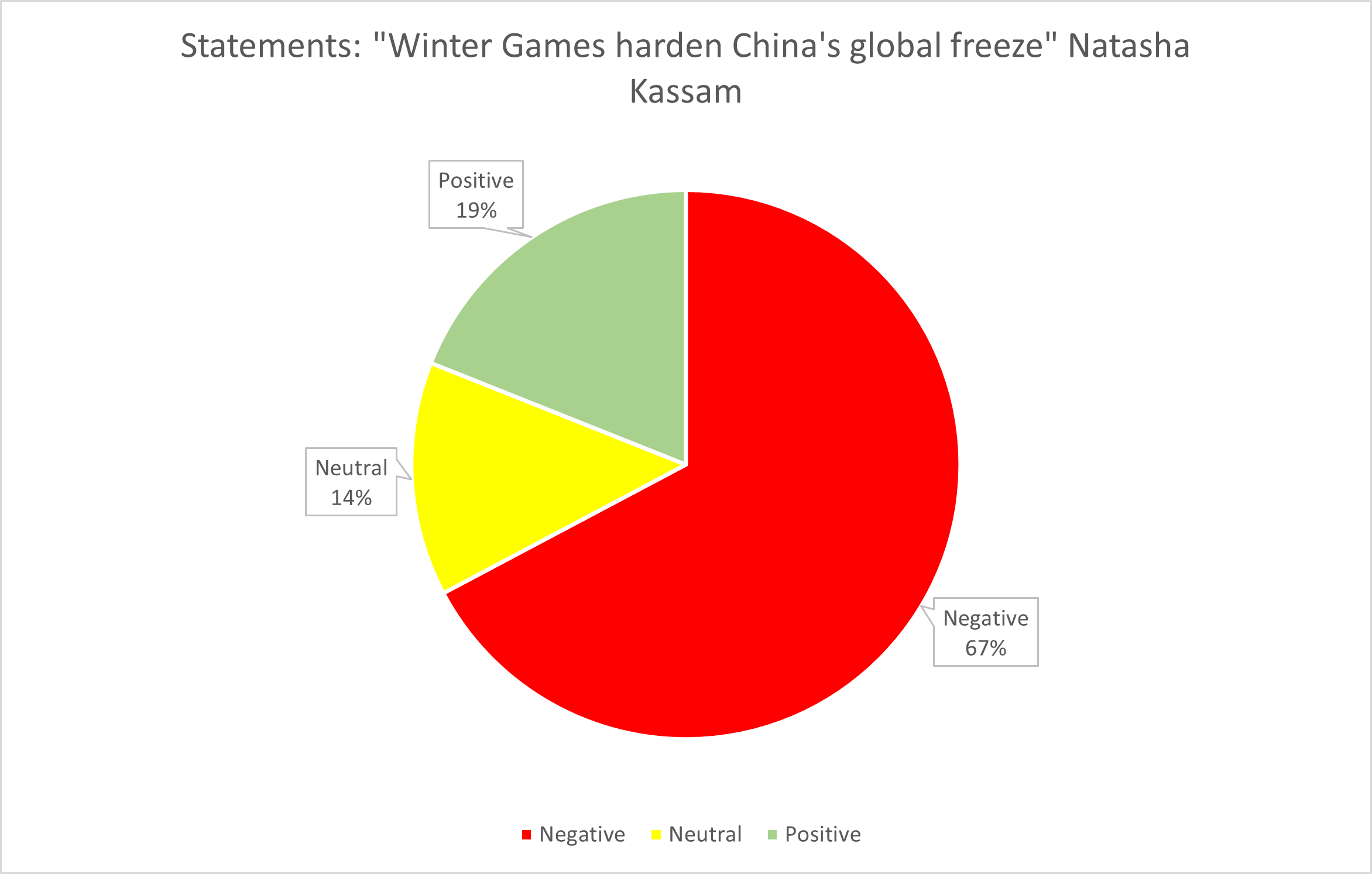Before I begin to explain, yet again, the sorry state of the ABC in relation to reporting on China, a quick reminder of the Standards written into the ABC Editorial Policy, reinforced in their Charter and therefore governed by legislation by which the ABC operates.
Namely:
The Standards
4.1 Gather and present news and information with due impartiality.
4.2 Present a diversity of perspectives within a reasonable timeframe, aiming to reach a similar audience, so that no significant strand of thought or belief within the community is knowingly excluded or disproportionately represented.
4.3 Take care in the presentation of analysis and commentary. Do not present them as the editorial opinion of the ABC.
4.4 Do not misrepresent any perspective.
4.5 Do not unduly favour one perspective over another.
This opinion piece will demonstrate how Jeremy Fernandez’s Undersea fibre optic cables could be the next geopolitical frontier | ABC News manages to breach every one of the standards above.
Jeremy is a very attractive ABC presenter with one of those beautiful presenters voices which can easily lull one in to a complacent relinquishment of analytical sensibility. He does a brilliant job of commentary on sequins at the Gay Mardi Gras – but you will understand, by the end of this piece, how, in commentary on technical issues he is way out of his depth and in geopolitics is a loyal servant of the ABCs groveling deference to the US Empire.
The standard way in which the Empire’s servants begin their ‘documentaries’ is fear-mongering, which drives the entire production and so must introduce it. So, of course, we begin with:
“paralysed”, “surveillance, espionage, and even sabotage”, “cyber-attacks”, “Cold War 2.0”, “brinkmanship” and “Beijing and Washington accuse each other of tapping cables”
and
“We have a war in our backyard.”
“I think it’s a Cold War 2.0.”
“We have been asked to make sides.”
“a battle”
Naturally, all paranoia regarding the danger of living in the Internet age should be tapped into as early as possible, so the audience has the ‘right’ set for the story.
Jeremy’s technical ineptitude follows the alarm-raising. We have this gem:
Almost everything you say or do online, whether it’s on your computer or your phone, instantly ends up on a beach like this, crisscrossing the oceans through undersea cables.
When you choose to communicate, you choose how your data moves through the Internet. Some, mostly social media from US tech giants, goes off shore. Other packets of data with different purposes, never go off-shore. Some remain firmly behind a firewall. It’s almost impossible to tell what is going where.
Then:
There’s a battle for control of Neptune’s Kingdom – the cloud under the sea.
The cloud is not underwater, even if there are proposals for locating it there to save the energy required to cool servers. It is on the land and the very architecture of the Internet and storage structures makes it almost impossible to determine where it is. If you want to “control” the internet, good luck. You first need to control every place on earth.
If I consider my own communications, I note that my data does not begin its journey on any wire. Maybe Jeremy simply hasn’t caught up with Starlink.
Next, having sounded the alarm-bells and then mischaracterised the Internet, Jeremy moves to drama to keep us worried about the world outside. We hear all about Tonga’s catastrophic experiences of a volcano. If we don’t fear the spies under our bed, surely we must tremble before Nature?
Natural disasters the size of the human Tonga Huhai volcano are rare, but it does show how quickly the whole country can be blacked out by Mother Nature.
Of course, the mythical Mother Nature did no such thing. Failing in their duty to provide secure communications, the Tongan government allowed the communications infrastructure to be vulnerable. My guess is that this was due to lack of capital.
Since 1966, when ARPANET was built by the US Defence Department, the elemental characteristic of the Internet was recognised – redundant infrastructure. If you don’t build as system by which, when data hits a blockage, it can continue along an alternative ‘route’ to its destination, you don’t have the Internet, you have a telegraph system.
This is Internet 101, something Jeremy does not seem to have yet mastered.
Almost the entire Internet relies on a single principle: that you can connect to places by joining them with a fiber optic cable running thousands of kilometers end to end across the ocean floor.
No, Jeremy. It doesn’t. The single principle upon which the Internet relies is redundancy.
But the vulnerability of undersea cables serves the real purpose of Jeremy’s ‘documentary’ – to present China as a looming threat to our very way of life.
If Tonga wants to stop blackouts, it needs to source capital to construct a second line, as pointed out much later in an interview with an Australian politician. Primarily, this is not a geopolitical issue – most small states in the Pacific are indebted to a range of East Asian banks – Japanese, Taiwanese, Korean and Chinese for development projects.
The potted history of modern telecommunications that follows gives little to help the reader understand the vulnerability or resilience of the global system. The difference in speed between two places might vary perceptibly if two routes are taken, but the massive redundancy of servers in most large systems means this can easily be overcome.
Critical information system maintain data as close to where they are needed as possible. Planes do not communicate their data to the cloud; nor do autonomous vehicles, even if they are updated via the cloud. The architecture of the systems depends on so many factors beyond where the backbone is laid.
Satellites no larger than a home vacuum cleaner proliferate and will eventually provide a robust alternative to undersea cables. As will floating wireless routers. The promise of the internet is that even if you stop me here, I can always build a way around.
Having given us no real understanding and driven up the anxiety, Jeremy now works on the real message – ‘Be afraid, be very afraid (of the Chinese)’. Bring on a battery of China haters.
The Chinese counterintelligence threat is more deep, more diverse, more vexing, more challenging, more comprehensive, and more concerning than any counterintelligence threat I can think of.
Right on cue.
Of course, there’s lip service to ‘another opinion’.
I understand that there are some people that want to treat our region as a bit of a chessboard for playing geopolitical games. That’s not the Australian government’s approach in the Pacific. You know, we want to see a region that’s peaceful, prosperous, and secure.
That’s from an Australian politician. What does it actually mean? Is this meant as a balance for a direct accusation that China is a threat? But never mind that the first hint of ‘balance’ comes almost half-way through the documentary.
Now we have the completely unchallenged story of Huawei and Australia’s shameful role. It’s not enough to simply state the facts – that no back door was ever found, that “national security concerns” are so vague as to be meaningless, that the actions of Australia, UK and the US undermined the principles of fair trade by excluding the most competitive corporation on specious grounds. Never mind that Huawei did what no other communications manufacturer has done before or after – lay bare their system. No, Jeremy simply turns to the hackneyed “top-secret information to be siphoned off to Beijing”.
It interesting to note that Jeremy’s 117 word smear of China is given 11 words in reply.
A proper journalist operating under the standards set out above would dig deeper to find whether the Australian accusation had any merit and offer interview time to a contrary opinion. But Jeremy is not interested in balance.
Marching on with the smear, we hear from a former Defense Minister and the myth of Chinse data harvesting is repeated, without any kind of evidence.
People are very wary of giving the Chinese government access to private communications.
The Huawei story is largely irrelevant to undersea cabling problems. It is irrelevant to the issue of vulnerability due to failure to duplicate conduits. But, since it reminds everybody that we boldly led the world in preventing Chinese interference, its relevance doesn’t matter. It’s included to contribute to the fear-mongering. And, of course, Fernandez knows that.
If we have anything in this miserable apology for a documentary that might be construed as balance, then the commentary on Huawei would be it.
So it’s again building infrastructure, buying into companies, getting the know-how, and developing. Again, it has been their strategy while the West has been like idiots, in my opinion.
But, don’t think on this too long, because now we have a ‘good solid opinion’ on China.
Its former president, David Panuelo, has accused Beijing of rampant bribery, corruption, and spying, saying China was attempting to take control of the nation’s submarine cables and telecommunications network.
Naturally, there is no need for Fernandez to go deeper into Panuelo’s accusations in search of evidence. I mean, why bother? It’s not as if he’s committed to “Do not unduly favour one perspective over another”.
So, who is Panuelo and what is his stake in the matter? Fernandez seems untroubled by the irony of Panuelo demanding $50 000 000 to stay in the one-China camp while pontificating about bribery.
March 10, 2023 (Reuters) – The Federated States of Micronesia (FSM) held talks with Taiwan in February about switching diplomatic ties for $50 million in assistance after frustrations with China, the outgoing president of the Pacific island nation has said in a letter.
It must be a terrible burden for an ABC journalist to conduct a 5 minute search on their sources. So much so, that just accepting one side of a story is common practice.
But, as they say in the irritating advertisement, “Wait, there’s more”. Now that we have quoted Panuelo, we have the perfect segwue to bring in a further irrelevancy, Taiwan. Is this because Taiwan is unique in terms of vulnerability of their cables by military attack? Well, no. It’s an issue for every country who lays these cables – or gas pipes, as NordStream demonstrated.
But, if you have the China-bad agenda to prosecute, then creating a threat to Taiwan must be included, relevant or not.
Subsea cables are pretty tough, but every three days or so, one gets cut, TeleGeography said. The primary culprits, accounting for about 85% of cuts, are fishing equipment and anchors. Telegeography, 6 Aug 2023
So, in the most congested waters in the world, with the most undersea cables of any region in the world, there have been an average of 5 per year. So, it must be China?
Having made the case for the danger to undersea cables only minutes before, we must now believe in deliberate sabotage. One doesn’t expect a third rate documentary maker to really look into this, but, hey, some people do.
Taiwan is located on the collision zone between the Philippine Sea and the Eurasian plates that converge at the rate of 80 mm year21(Yu et al. 1997, 1999). It has an uplift rate of 5.7 mm year21(Peng et al.1977; Liew et al. 1993). The tectonic setting of the island connects the Ryukyu arc–trench and the Luzon arc–Manila trench systems, and forms an extremely active region (Teng 1990; Liu et al.1997). As a result, Taiwan has a high frequency of earthquakes. Besides the tectonic setting, Taiwan is also located in the East Asian monsoon region. This geographical setting means that Taiwan faces torrential-rain-induced flooding in the plume rain(May–June) and typhoon (July–October) seasons. According to statistics from the Central Weather Bureau (http://www.cwb.gov.tw), in the last50 years (1958–2009) the numbers of tropical storms and typhoons formed in the western North Pacific Ocean was 26.6 per year, three or four of which affected Taiwan. These typhoons not only bring disasters but also precipitation to Taiwan, which is an important water supply for the island. Since 2006, southern Taiwan has experienced a series of earthquakes and typhoons that induced severe natural hazards on land, and caused huge loss of life and economic damage. At the same time, the earthquakes and typhoons also induced turbidity currents or underwater debris flows that caused submarine cable breakages. (Su, Chih-Chieh & Tseng, Jing-Yi & Hsu, Ho-Han & Chiang, Cheng-Shing & Yu, Ho-Shing & Lin, Saulwood & Liu, James. (2012). Records of submarine natural hazards off SW Taiwan. Geological Society of London Special Publications. 361. 41-60. 10.1144/SP361.5. )
Yes, it’s long and quite a read; too much for poor Jeremy.
So, having ignored the necessity to get alternative views on the breakages (and thus the editorial standards), Jeremy gives us the full suite of the anti-China Taiwan narrative.
“very, very serious situation for Taiwan’s security”
“Beijing increase military drills in the airspace and waters around Taiwan”
“coercive activities”
“record number of Chinese jets crossing the unofficial border”
“especially menacing”
“People’s Liberation Army were to attack”
Not sure who the bad guys are yet? Time for a bit of street walking by Jeremy to prove Taiwan’s ‘democracy’.
life in full color. It’s bustling with excitement and energy, and the aromas of the incredible food scene here. It’s also uniquely Taiwanese.
Yep. Just as the culture, cuisine and language is in all Chinese provinces – Anhui, Fujian, Gansu, Guangdong, Guizhou, Hainan, Hebei, Heilongjiang, Henan, Hubei, Hunan, Jiangsu, Jiangxi, Jilin, Liaoning, Qinghai, Shaanxi, Shandong, Shanxi, Shijiazhuang, Sichuan, Yunnan, Zhejiang.
Ever heard of Szechuan cuisine, Jeremy? Maybe you just don’t get out enough.
Jeremy treats us to a street walk, where most people appear happy and contented and largely disinterested in some westerner making a ‘documentary’. But Jeremy knows better. Lurking below those happy faces is “the anxiety that hangs in the air every single day”. If you can’t film the anxiety, make it up.
More tedious war-mongering follows.
While ramping up its military presence in the region, China is waging a strategic battle on another front, stripping countries from Taiwan’s already short list of diplomatic allies. Taipei is losing friends as Beijing continues to isolate the self-governed island.
Since the documentary can’t actually show you any evidence of alleged dangers, time to escalate the rhetoric.
“ramping up”, “waging battle”, “stripping countries”, “isolate”, “poached”, “spy”, “steal data”
The frenzy continues with:
“interference”, “intellectual property theft”
But no rhetorical ejaculation is complete without a damn good accusation of Belt and Road debt traps. Long since thoroughly debunked by experts who, unlike Jeremy, actually know what they are talking about, it none the less provides an orgasmic climax for Jeremy. Well, not quite. We still have the Quad to go.
Repeat after Jeremy:
We seek a region where no country dominates and no country is dominated—one where all countries are free from coercion and can exercise their agency to determine their future.
But, lo, Jeremy does not leave us hanging limply with a Quad non-statement. Salvation is at hand. Google and Microsoft will bravely go where no transnational has gone before and save the Pacific Islands with their inimitable generosity. Naturally, nothing that China might offer in terms of development could match this offering.
Since we now know how wicked China is and how benevolent the tech giants intend to be, it’s time to return to Tonga, where we should sympathise with their plight. But linger not too long, because Jeremy has a mandatory backend quote from a dissenter.
After our long sojourn into the evil of the most evil empire, to get the mindset right, it’s time for an expert to expose the real state of submarine cable geopolitics. While Chinese companies build cables globally, the US sabotages building projects. Even Jeremy and the ABC can’t slant this one.
But, just as we get to understand that US sabotaging of global communications, anticipating a deep dive into how the US operates globally, we must steer to yet another red herring.
Breaking news: “Snowden proved the US was spying like everyone else.”
More breaking news: “Big tech is stealing and selling your data”
Even more breaking news: “Underwater drones capable of interfering with cables”
And the biggest news of all: “Chinese have come up with a radical new way to protect their data.”
Jeremy’s orgasm is palpable. And, to bring us down to the gentle earth, a wholesome postscript.
That data holds the key to how we manage the biggest questions of our age: the education of our children, our health, wealth, cultural identity, climate change, war, and peace.
It’s an hour of irrelevancy where the loudest voices and the longest narration is anti-China, where actual Chinese speakers get 11 words in reply. Not a single standard is honoured. But editorial standards are not to apply, but to window-dress the hopeless state of ABC ‘journalism’.
Here’s a brief summary of the substantive points, free of the anti-China noise, miracle solutions and pontifications.
“All countries, regardless of size, must look to that natural quality called redundancy, vital to the structure of the internet, to protect their communication assets at every level. Those who cannot afford to do so look to large countries to assist them. Foremost of these is China, both in development funds and expertise. The End”
There you go, Jeremy. A one minute documentary.
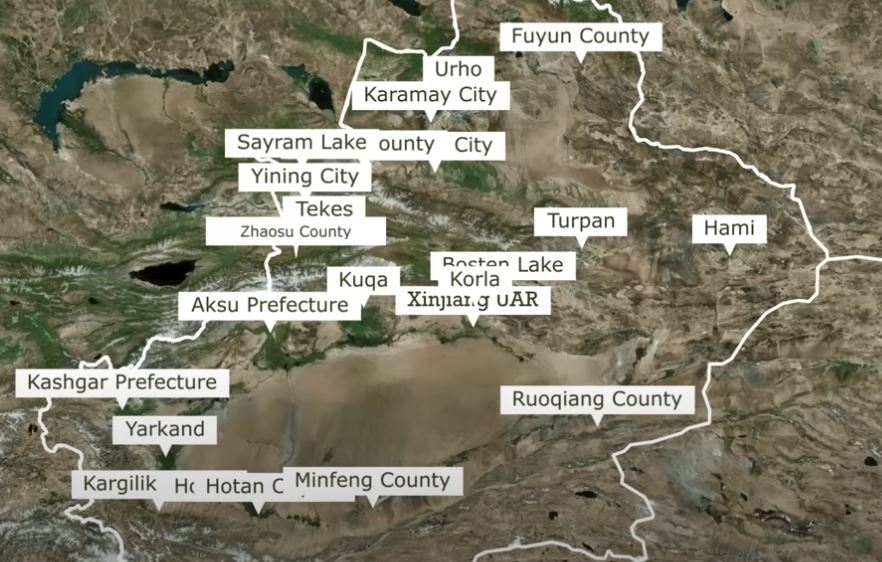 David is, of course, an expert in Central Asian culture and, for this reason, has a keen eye in identifying culture that is not authentic. Those smiling dancers – they’re suspect. Everyone knows that, in their repressed state, they should not be smiling, but are being coerced into smiling.
David is, of course, an expert in Central Asian culture and, for this reason, has a keen eye in identifying culture that is not authentic. Those smiling dancers – they’re suspect. Everyone knows that, in their repressed state, they should not be smiling, but are being coerced into smiling. Although this slipup must have been punishing to the anti-China script, David soldiers on with attempting to find someone who will speak ill of the changes in Xinjiang. Ni Jaoyu is of no use as he is willing to say, “Obvious traffic, roads, life employment. We can see happy smiles on people’s faces”. Those smiling people again. Can they not just frown for the good of the story?
Although this slipup must have been punishing to the anti-China script, David soldiers on with attempting to find someone who will speak ill of the changes in Xinjiang. Ni Jaoyu is of no use as he is willing to say, “Obvious traffic, roads, life employment. We can see happy smiles on people’s faces”. Those smiling people again. Can they not just frown for the good of the story?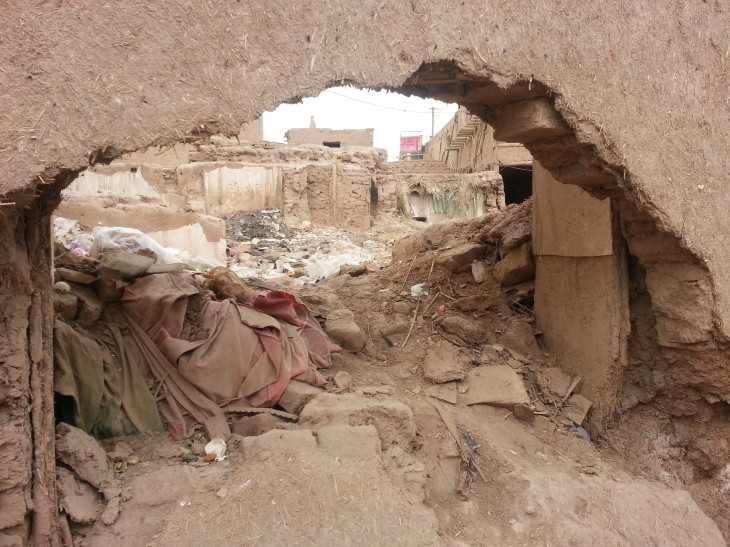
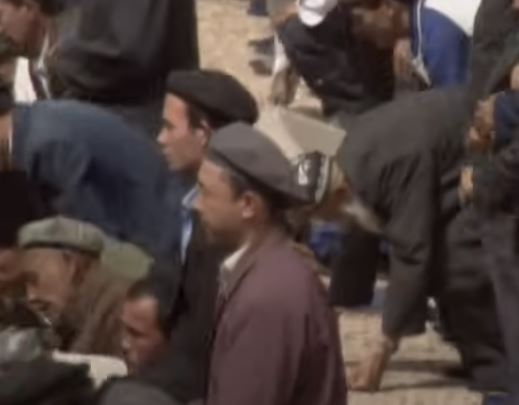

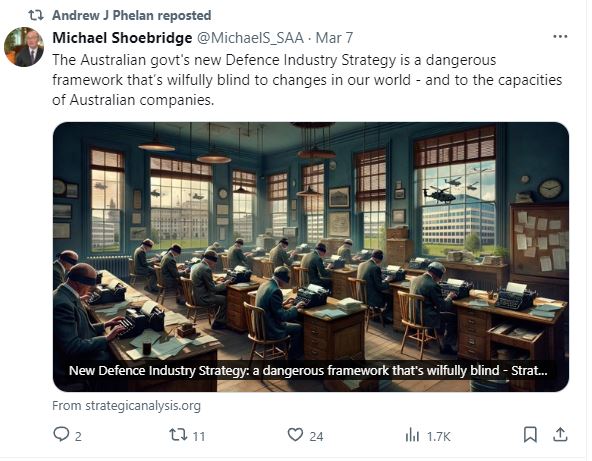
 Jeff Jacoby, columnist at the Boston Globe, produces our first Idiot File piece.
Jeff Jacoby, columnist at the Boston Globe, produces our first Idiot File piece.

 April 5, 2022, Malachy Browne and Dmitriy Khavin, New York Times
April 5, 2022, Malachy Browne and Dmitriy Khavin, New York Times

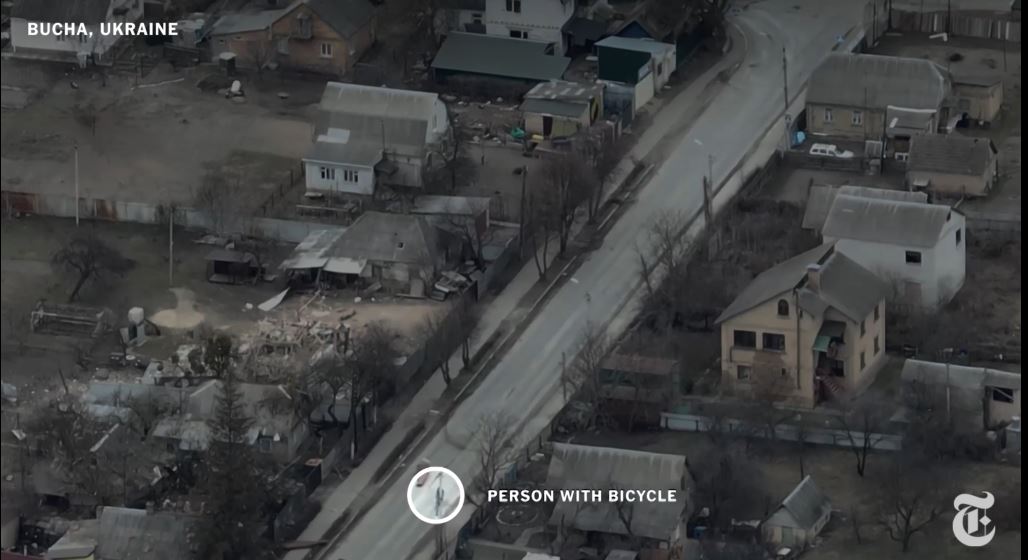
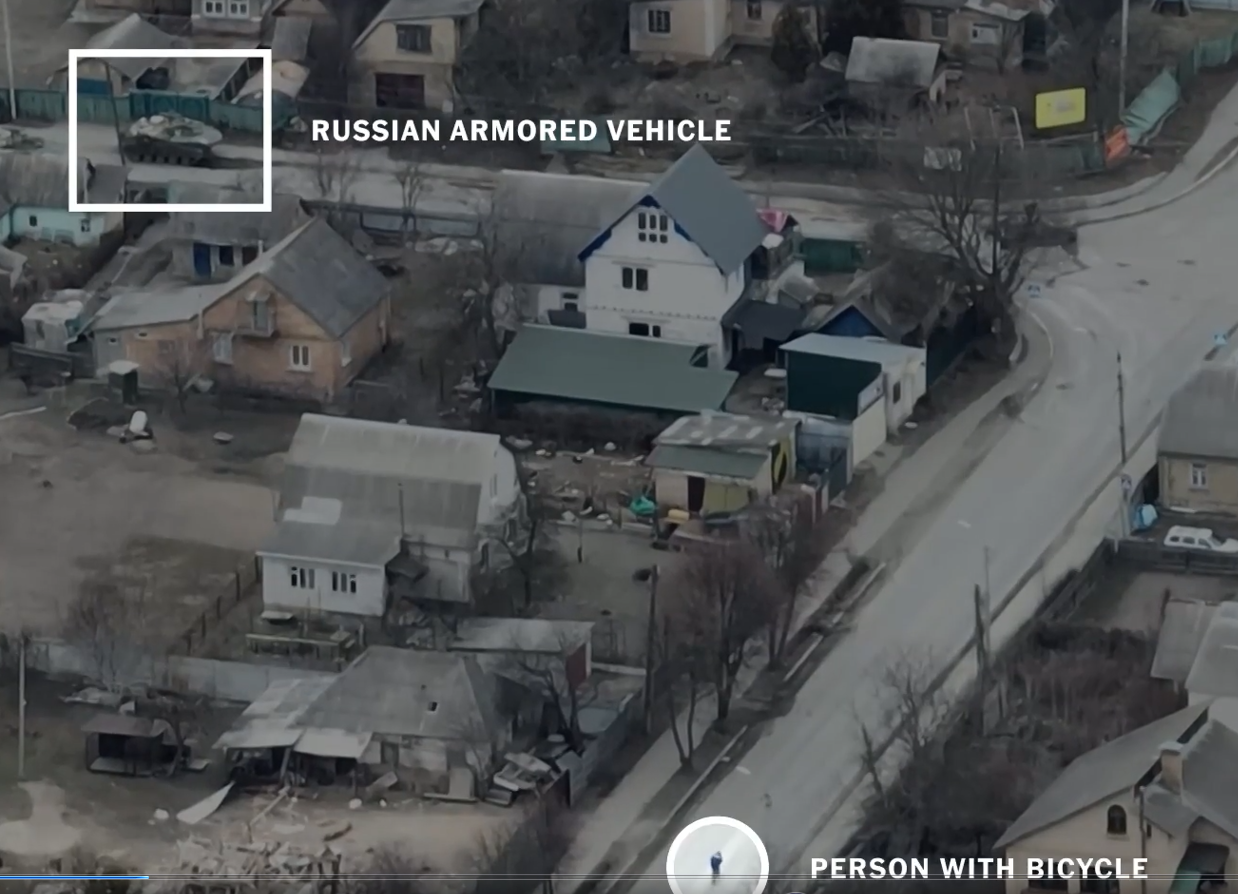
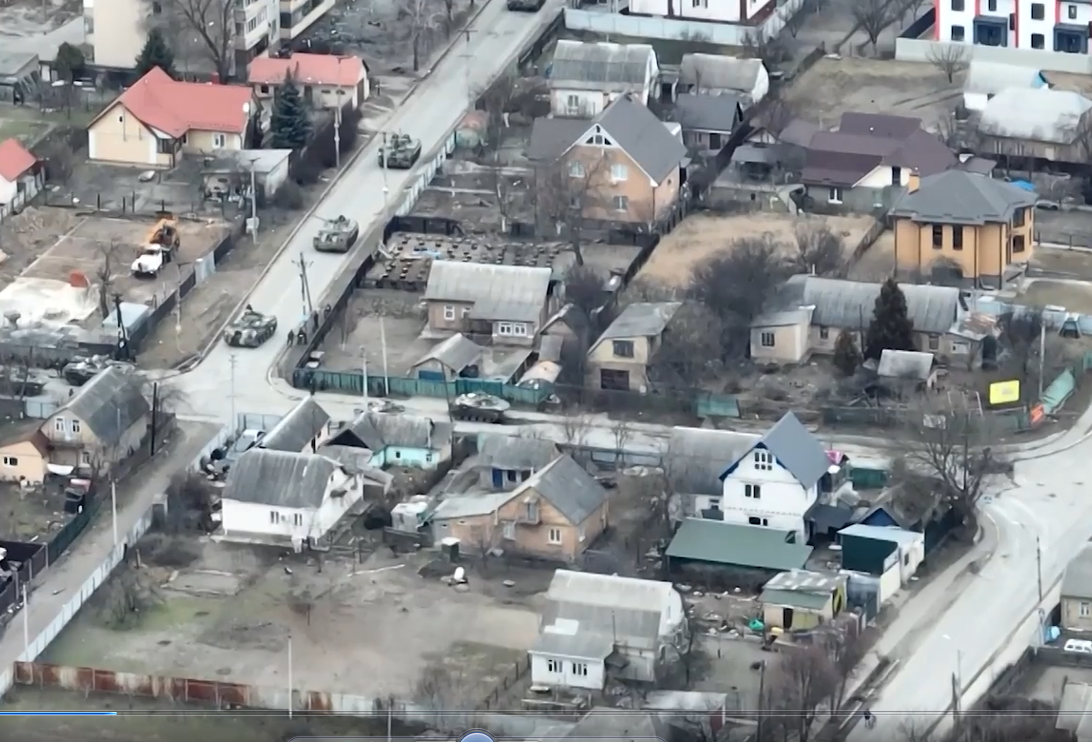 But a single tank or armoured car is not enough for dramatic effect. We must establish that this is a great force prepared to trample all before them. The tension rises. We already know the outcome. Our tiny David has collided with Goliath.
But a single tank or armoured car is not enough for dramatic effect. We must establish that this is a great force prepared to trample all before them. The tension rises. We already know the outcome. Our tiny David has collided with Goliath.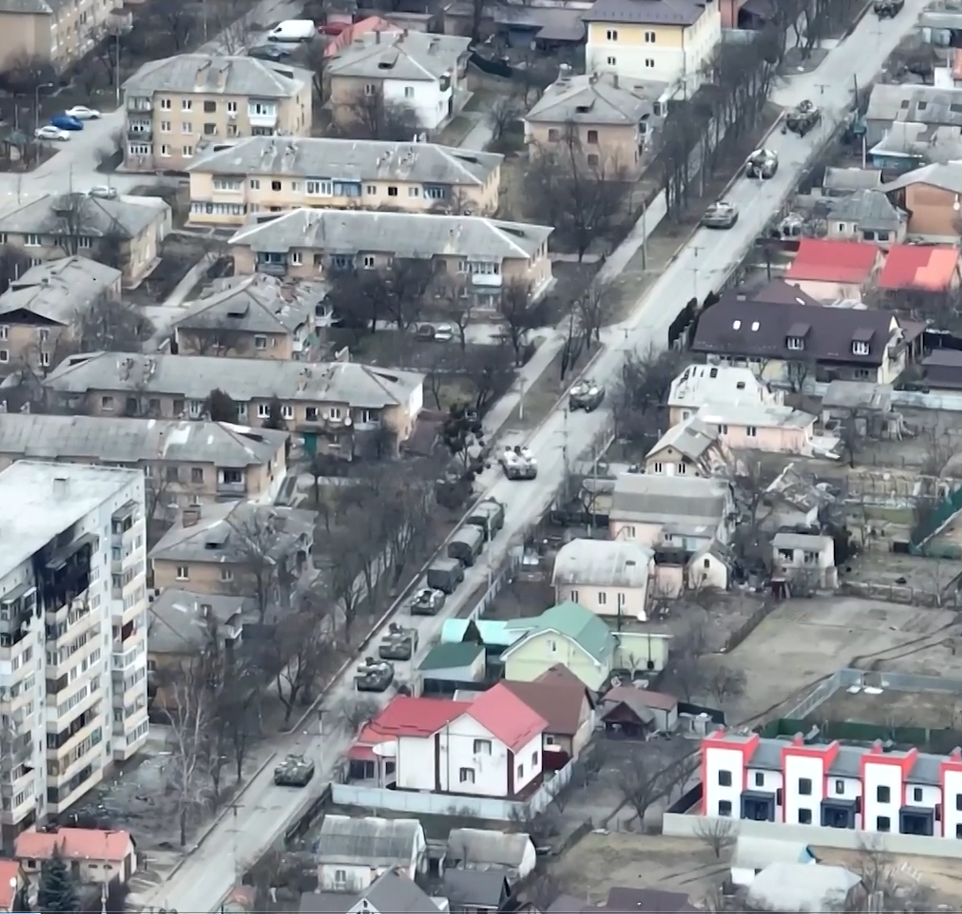 A quick cut to the action, with suitable labels, to keep our mind on the narrative. ‘Person on bicycle’ is almost certainly doomed.
A quick cut to the action, with suitable labels, to keep our mind on the narrative. ‘Person on bicycle’ is almost certainly doomed.